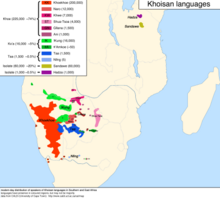
Back Boesman AF شعب بوشمن Arabic بوشمن ARZ San AST Buşmenlər AZ Сан (народ) BE Бушмени Bulgarian বুশম্যান Bengali/Bangla San Catalan Křováci Czech
 | |
| Total population | |
|---|---|
| ca. 160,000 | |
| Regions with significant populations | |
| 71,201 (2023 census)[1] | |
| 63,500 | |
| ca. 7,000 | |
| ca. 16,000 | |
| 1,200 | |
| Languages | |
| Languages of the Khoe, Kxʼa, and Tuu families, English, Portuguese, Afrikaans | |
| Religion | |
| San religion, Christianity | |
| Related ethnic groups | |
| Khoekhoe, Coloureds, Basters, Griqua, Sotho, Xhosa, Zulu, Swazi, Ndebele, Pedi, Tswana, Lozi | |

The San peoples (also Saan), or Bushmen, are the members of any of the indigenous hunter-gatherer cultures of southern Africa, and the oldest surviving cultures of the region.[2] Their recent ancestral territories span Botswana, Namibia, Angola, Zambia, Zimbabwe, Lesotho,[3] and South Africa.
The San speak, or their ancestors spoke, languages of the Khoe, Tuu, and Kxʼa language families, and can be defined as a people only in contrast to neighboring pastoralists such as the Khoekhoe and descendants of more recent waves of immigration such as the Bantu, Europeans, and Asians.
In 2017, Botswana was home to approximately 63,500 San, making it the country with the highest proportion of San people at 2.8%.[4] 71,201 San people were enumerated in Namibia in 2023, making it the country with the second highest proportion of San people at 2.4%.[1]
- ^ a b "Namibia 2023 Population and Housing Census Main Report" (PDF). Namibia Statistics Agency. Retrieved 30 October 2024.
- ^ "Foragers to First Peoples: The Kalahari San Today | Cultural Survival". www.culturalsurvival.org. 28 April 2010. Retrieved 30 March 2024.
- ^ Walsham How, Marion (1962). The Mountain Bushmen of Basutoland. Pretoria: J. L. Van Schaik Ltd.
- ^ Hitchcock, Robert K.; Sapignoli, Maria (8 May 2019). "The economic wellbeing of the San of the western, central and eastern Kalahari regions of Botswana". In Fleming, Christopher; Manning, Matthew (eds.). Routledge Handbook of Indigenous Wellbeing (1st ed.). Routledge. pp. 170–183. ISBN 9781138909175 – via ResearchGate.